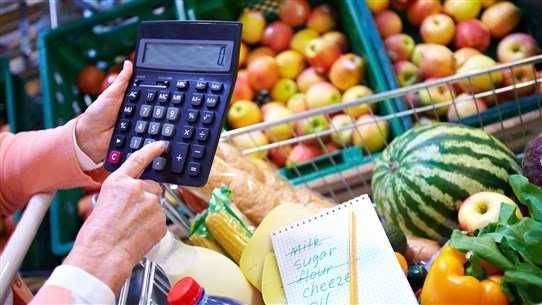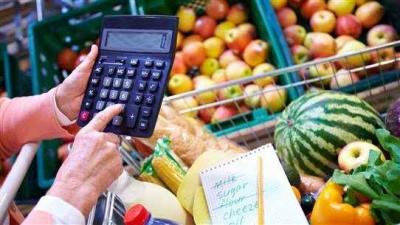What comes after the approval of the budget is different from what preceded it. The economic scene can be summarized by two factors: the rising cost of living against the declining purchasing power, resulting in the country heading towards more poverty. Away from the numbers, citizens will feel the repercussions of the budget from two sides: first, the increases stemming from raising the customs dollar to 15%, and second, the doubling of salaries for public sector employees, military personnel, retirees, and contractors. Although this does not meet the needs of living and rising costs, it has provided oxygen for at least 600,000 Lebanese. However, what the state gives with one hand, it will take back with the other due to the upcoming inflation and expected price increases.
While the customs dollar has not yet officially entered into effect, and is on the verge of being implemented, many questions are being raised by citizens and merchants today: What is the average expected increase in prices? Which goods will be affected by the customs dollar and which will be exempt? When will it take effect? Will it be applied immediately upon issuance, or will it consider goods shipped before its issuance, currently still at sea?
Starting with food items, which are the most consumed by citizens on a daily basis, how will they be affected by the customs dollar? In this context, the head of the supermarkets’ owners association, Nabil Fahd, told "Al-Jumhuria" that food prices are constantly changing due to rising operating costs. Even if some goods are unaffected by the customs dollar, several factors contribute to their increase. He stated, "The most affected food items today by the increase in the customs dollar are canned vegetables imported from abroad, such as corn and mushrooms, with prices expected to rise by 35%. Foreign wine will see a customs increase of 70%. Other goods, like grains, rice, and sugar, should not change their prices as a result of the customs dollar. However, for example, the price of sugar has doubled per ton in Europe, rising from $700 to $1400, indicating that its price is set to rise for global reasons. Similarly, grains, which are exempt from customs and VAT, will be affected by the rise in their global prices or by increases in their operating costs, particularly related to fuel prices."
Fahd confirmed that the increase in prices in the upcoming period will primarily result from global inflation, which will be much greater than current rates, particularly due to rising gas and oil prices globally. He reiterated that the customs dollar's effect on some food item prices that are not exempt has not yet been adopted, but it will gradually start to appear in the coming stages, especially on durable goods, spare parts, electrical tools, and furniture. He clarified that the recent price changes or increases resulted from the rise in the dollar's price in the black market to 39,000 pounds.
Addressing fears regarding potential stagnation or a decrease in market activity due to the customs dollar, he commented: "Consumer movement is already very weak, and citizens are barely purchasing their needs. The customs dollar and global inflation will further reduce this activity, even though a significant number of food commodities are exempt from customs."
Fahd expressed concern that raising the customs dollar to 15% may boost smuggling activity, impacting not only prices but also the quality and safety of food.
For his part, Economic and Social Council member Adnan Ramal told "Al-Jumhuria" that merchants have not changed prices yet because there is no definitive decision to adopt the customs dollar. He explained that the budget estimated state revenues based on a customs dollar rate of 15,000, but the customs dollar was not included in the budget text and needs to be issued via a separate decree, becoming effective once published in the official gazette. But will it be applied immediately after issuance or will it observe goods shipped before the law was enacted?
In response to a question, Ramal noted that the average expected increase in prices for imported goods will range between 20% to 25%, with a minimum increase of 7% and a maximum of 35%. He attributed this substantial increase to the fact that the customs dollar is calculated after including the shipping cost, insurance policy, and dock fees, which, once calculated, will be added to the total amount, with 11% VAT also applied. He predicted that prices in the market would not increase immediately until new goods begin entering Lebanon, at which point pricing and associated costs can be established.
Ramal expressed concern about three key elements accompanying the customs dollar:
- An increase in the inflation rate would lead to contraction and stagnation, reflected in a decrease in import levels, which means the state will not collect the expected revenues. With inflation, citizens' purchasing power will decline, leading them to purchase only essential food items, while some merchants might cease imports due to rising costs.
- Goods imported during the first eight months of 2022 were expected to cover market needs for six months ahead. Additionally, merchants imported in large quantities as a preemptive step before the customs dollar was approved. Consequently, their inventory should last at least another six months, preventing new imports during that time, negatively impacting state revenues, which would be significantly lower than estimated.
- The significant erosion of citizens' purchasing power due to exorbitant prices would mean that citizens would not be able to spend as before, undermining revenues and the increases provided to the public sector.
Most critically, when these elements converge, the smuggling market may strengthen at the expense of the legitimate economy.




